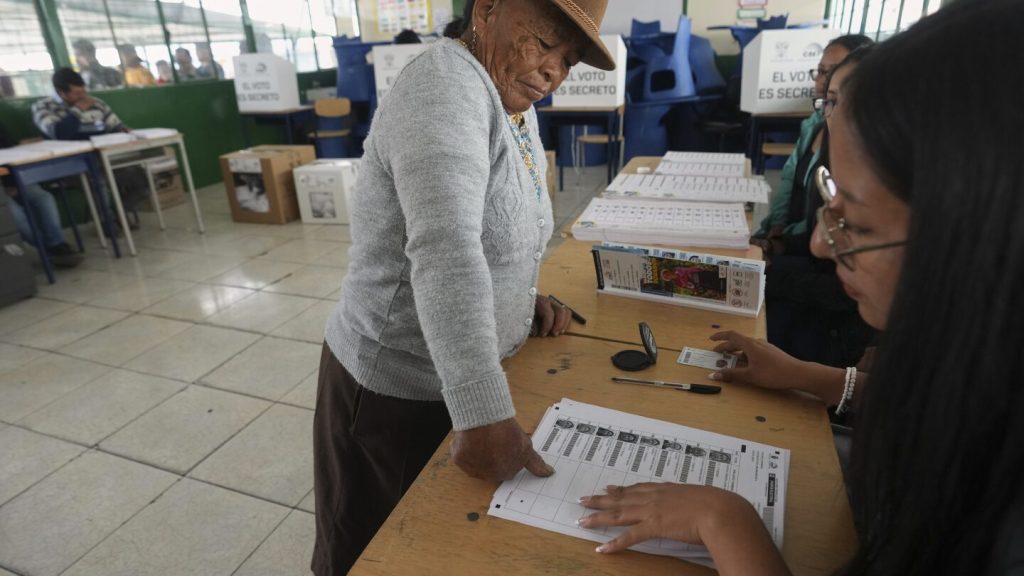Ecuador’s Presidential Election: A Nation Divided Over Crime and Leadership
The 2023 presidential election in Ecuador has unfolded as a dramatic rematch between two prominent candidates: incumbent President Daniel Noboa and Luisa González, a protégée of the influential former President Rafael Correa. The election has captivated the nation, with crime and governance emerging as the central issues. Voters are weighing their options as the country grapples with a surge in violence linked to drug trafficking from neighboring Colombia and Peru. The elections are seen as a critical moment to determine whether Noboa can continue his efforts to stabilize the country or if González can bring the change that many Ecuadorians desperate for security and economic improvement are seeking.
Crime and Insecurity: The Defining Issue of the Election
Crime has become a pervasive issue in Ecuador, with gangs, extortion, and homicide rates soaring to alarming levels. Many voters, like Marta Barres, a 35-year-old mother of three, are paying monthly bribes to local gangs to avoid harassment. Barres, who expressed her frustration with Noboa’s leadership, believes González is the only candidate who can address the crime crisis and rejuvenate the economy. Ecuador’s homicide rate has dropped under Noboa’s presidency, from 46.18 per 100,000 people in 2023 to 38.76 per 100,000 last year, but it remains far higher than the 6.85 per 100,000 reported in 2019. The election has become a referendum on whether Noboa’s hardline approach to crime is effective or whether a new leader is needed to tackle the root causes of insecurity.
The Candidates: Noboa and González
President Daniel Noboa, a 37-year-old millionaire and heir to a banana trade fortune, has built his campaign on his tough-on-crime agenda. His tenure has been marked by controversial tactics, including declaring a state of internal armed conflict and authorizing a police raid on the Mexican embassy to arrest a fugitive ex-vice president. While some critics accuse him of overstepping legal and ethical boundaries, supporters, like retired doctor Pablo Votruba, praise his direct confrontation with drug-trafficking groups and corrupt officials. Noboa’s political rise began in 2021 when he won a seat in the National Assembly, and his business background has shaped his pragmatic approach to governance. On the other hand, Luisa González, a 47-year-old former lawmaker and mentee of Rafael Correa, has positioned herself as a symbol of hope and change. She promises to restore stability and improve living conditions, appealing to voters disillusioned with the current administration.
Voter Sentiment: A Nation in Crisis
Voter turnout was high, with over 83% of Ecuador’s 13.7 million eligible voters casting ballots. In the port city of Guayaquil, long lines of voters braved rain and scorching sun to make their voices heard. Many citizens expressed deep frustration with the current state of affairs, with some, like architecture student Keila Torres, doubting that any candidate can address the systemic corruption and crime that have become entrenched in Ecuadorian society. Others, like Marta Barres, are placing their hopes in González, believing she can bring about meaningful change. The election has exposed the deep divisions in the country, with voters torn between supporting Noboa’s assertive but controversial methods and taking a chance on González’s promises of reform.
The Electoral Process and Security Measures
The election was conducted under tight security, with over 100,000 police officers and military personnel deployed across the country to safeguard voting centers. President Noboa, accompanied by a large security detail, cast his ballot in the coastal town of Olón, while González voted in her hometown of Canuto. Despite the extensive security measures, some incidents marred the process, such as soldiers temporarily barring candidate Andrea González from entering her polling station with her security detail. The National Electoral Council reported that results would be released after 7:30 p.m. local time, with a runoff election scheduled for April 13 if no candidate secures an outright victory.
The Road Ahead: Challenges for Ecuador’s Next Leader
As Ecuador awaits the outcome of the election, the road ahead for the next president will be fraught with challenges. Crime and corruption remain entrenched, and addressing these issues will require more than just tough rhetoric or controversial tactics. The new leader will need to strike a balance between maintaining security and upholding democratic norms, while also addressing the economic and social inequalities that have fueled discontent. Whether Noboa can continue his efforts to reduce crime and stabilize the country, or whether González can deliver on her promises of hope and change, will shape the course of Ecuador’s future. For voters like Marta Barres and Keila Torres, the stakes are personal, as they seek a leader who can restore a sense of safety and opportunity in a nation grappling with crisis.












